by Brian Hioe
語言:
English /// 中文
Photo credit: 林穎孟 迎夢台北大安文山/Facebook
Translator: Brian Hioe
On October 17th, New Bloom editor Brian Hioe interviewed Lin Yingmeng of the New Power Party, who is running in the Daan-Wenshan area of Taipei. This is part of New Bloom’s ongoing series of interviews with independent city councilor candidates, as part of its special 2018 election coverage.
Brian Hioe: Can you first introduce yourself for readers who may not know you?
Lin Yingmeng: Fundamentally, I am a nerd who likes to play video games. I originally was in the tech industry, working on the development of an app at a game company. Later on, I came to work in the Legislative Yuan.
BH: What led you to participate in politics? From what kind of background did you begin?
LY: In the past, I never thought that I would end up working in the political system. I studied in the department of sociology at Tsinghua National University, and then also in the department of sociology for my MA at National Taiwan University. Not only did studying these things led me to be more concerned with society and politics, but they also spurred me on to actually participate in some social movements on the side.
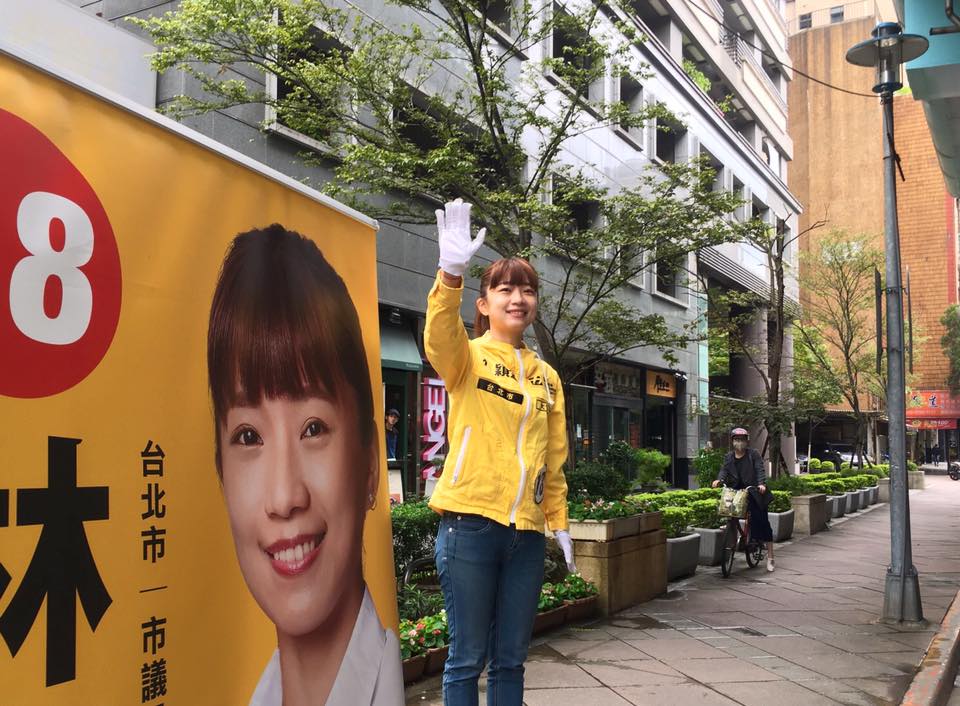 Photo credit: 林穎孟 迎夢台北大安文山/Facebook
Photo credit: 林穎孟 迎夢台北大安文山/Facebook
For example, I worked in some NGOs as a volunteer on days off. Or when there were actions, I would sometimes participate. But I don’t believe that this counts as work within the system. The reason why I participated in the Sunflower Movement is that I thought social movements were important as a means of pushing on the government and allowing the voice of the people to be heard. However in the end, with 500,000 people on the streets, the government still shrugged off our demands, saying that if you had no one in political power, they wouldn’t listen.
This made me feel like it wasn’t enough to simply have a social movement. Even if you have a lot of supporters, they can still just rule over you, so I felt that young people such as ourselves needed to find a way to enter into the political system to accomplish political change.
BH: Why would you join the New Power Party? What kind of values do you think that the New Power Party represents?
LY: Originally I joined hoping to be an aide. When the NPP was running, their views were closer to mine. Because I had studied sociology, I knew that campaigning meant having to go to places like fruit and vegetable markets and describe current political problems in simple, direct terms, which regular people can understand.
This is a specialized skill. This is not something anyone can do. I believe the NPP was able to accomplish this aim in 2015, using words that people could understand to describe its political demands and what it hoped to do. So at the time, I saw that to be a part of a political party—especially such a new one—you needed these sorts of specialized skills, and I think I saw this within myself.
So after the NPP won, I felt that the party could not give up in the future. I felt I should not just be an observer, to be a social movement participant. As a result, I decided to put my energy into politics, and I began to work as Freddy Lim’s legislative assistant in 2016.
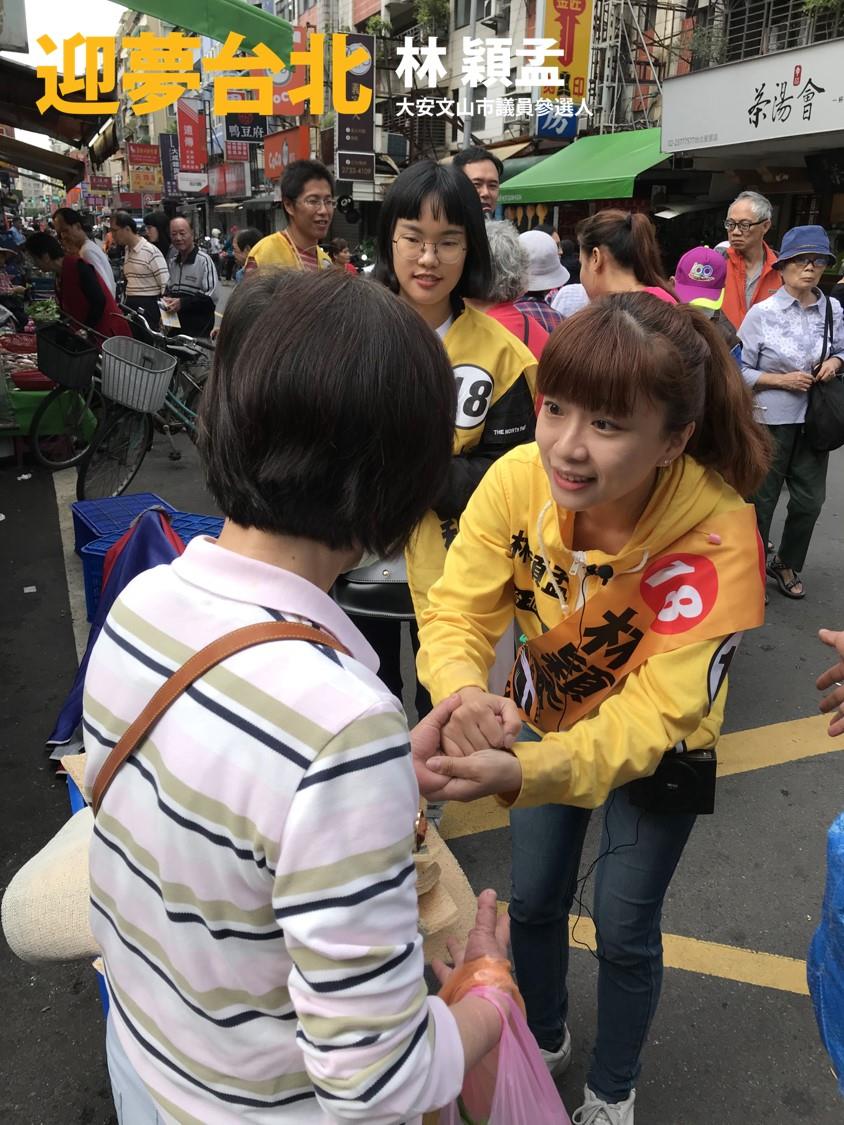 Photo credit: 林穎孟 迎夢台北大安文山/Facebook
Photo credit: 林穎孟 迎夢台北大安文山/Facebook
I did this for two years, up until 2018, when I first ran in an election. Why did I decide to join the elections? It was at the time unexpected, because I originally hoped to be an aide. But in 2017, Freddy Lim encouraged me to run, saying that the NPP had the aim of being a ruling party. If so, the party needed to expand and to obtain more seats through elections.
This was an important aim, so they began to look for people to participate in the 2018 elections. And since I was Freddy Lim’s legislative aide, while working together, he kept on saying that it seemed like I had a lot of opinions and thoughts in regards to the content we were working with, And he believed that, as a young person, I should throw myself into the arena more. So that’s how I came to participate in elections.
This aspect is a challenge. Because I’m fundamentally an introverted person who likes to play video games, I’m not great at public speaking, and I believe that politicians up to now generally are very good at public speaking. I felt, could I really do this? But later on he told me that not all politicians have to be good at speaking, there just have to be some people who work in the background as well. He felt public speaking was something that could be developed through practice.
This was generally why I felt I could run.
BH: What do you feel are the core values of the New Power Party?
LY: For me, the NPP first aims for the normalization of the country’s status. Second, the NPP has a center-left political stance. In reality, the DPP also talks about normalizing the country. [Laughs] But what the DPP advocates on this currently is not very clear—it’s gotten a bit messy, and now they’re just trying to maintain the status quo.
Of course, the idea that it’s necessary to normalize the country is also something we stand for. But I believe that it’s not enough for just the DPP to push for this. Likewise, the DPP is a thirty-year-old political party, it is becoming older, and in comparison to them, we push for the normalization of the country in a different way. For example, many NPP members are part of the “natural independence” (天然獨) generation and have views that differ from those from the older DPP period who believe that Taiwan is not yet a country.
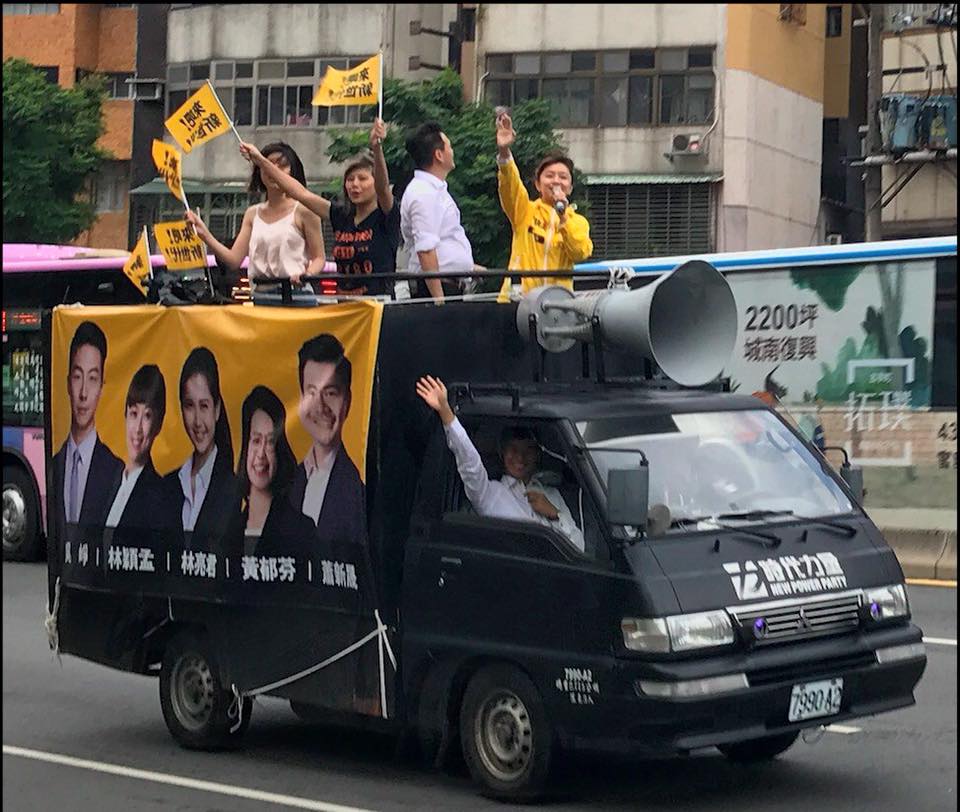 Photo credit: 林穎孟 迎夢台北大安文山/Facebook
Photo credit: 林穎孟 迎夢台北大安文山/Facebook
So I feel that it’s necessary for there to be a voice representing the current generation calling for the normalization of the country. Moreover, I also believe it necessary for Taiwan to have a center-left party.
There are no parties which currently hold seats which are center-left apart from the NPP. For example in regards to our support for marriage equality or labor rights. I believe that is not just because we are closer to young people, but because we believe it’s necessary to push for a spectrum of values in Taiwanese politics. These are what I think the values of the NPP have been up till now.
BH: What do you think is particular about running in this area? Who are your opponents and what kind of strategy have you adopted?
LY: The Daan-Wenshan area is very traditional. By this, I mean there are many members of the military, as well as teachers, and public servants, so this district traditionally will vote for the KMT—particularly Wenshan. So running in this area, it is not easy, because they are used to voting for certain politicians already.
So this is what is particular about my running. Of course, regarding what I said before, as a person that lives here, I feel that Daan-Wenshan has a very personal flavor. In Wenshan, neighbors tend to know each other, and they pay attention to the connections between people. But for elections, this is not easy, because there are already organization networks in place, and so there are two sides to these connections that exist here.
As for Daan, it is relatively easier to enter into. This is because in Daan, most people live in high-rises, and they have a feeling of preserving their independent lives in the city. There are, of course, social connections, but they may think about want what kind of candidate they want and what they share with these candidates. They will look at your political opinions.
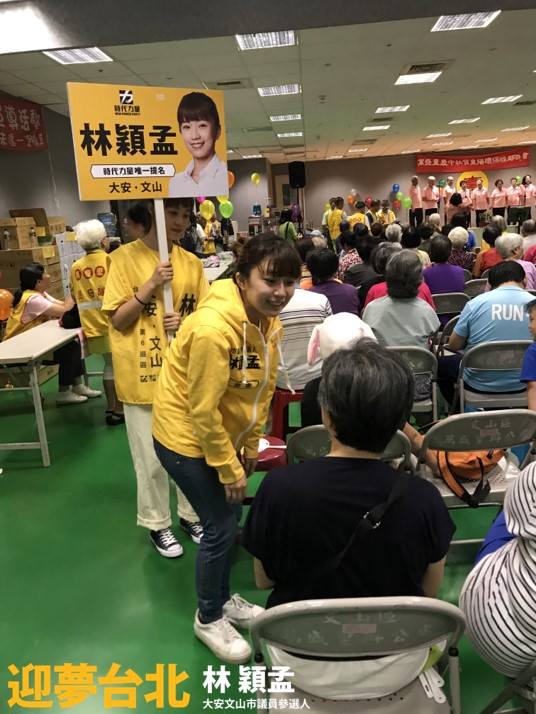 Photo credit: 林穎孟 迎夢台北大安文山/Facebook
Photo credit: 林穎孟 迎夢台北大安文山/Facebook
It’s not that Wenshan people won’t look at your political opinions. [Laughs] But what I mean is Daan people are very concerned with the character of candidates and don’t necessarily need or want direct contact with you. They may not even want to meet with you, because they think it’ll be annoying or a hassle. But they still may read about you in terms of how you come off in the news, what the political views expressed on your campaign materials are.
As such, for me, I don’t as much need to establish long-term—ike ten or twenty year long— relationships with these constituents. Instead, I can influence them more from the media. These are what is different between Daan and Wenshan.
As for competing with opponents, I focus on pan-Blue candidates. This area has historically been more pan-Blue than pan-green, so the question is, are we able to win votes from those in the center, and decrease the pan-Blue prominence in this area? I hope to pull down the KMT and New Party candidates in this area.
BH: What about election strategy?
LY: Fundamentally, because Wenshan is more traditional, we are campaigning in a traditional manner. Such as canvassing in markets, standing on street corners, and participating in neighborhood activities. This is what Wenshan cares about. If you try to advertise from a distance, it may be less effective, so you have to campaign like this in Wenshan. So we do all this to let them see us and see that we are hardworking. If you come off as someone who looks down on them, someone who is arrogant, and you are not willing to listen to them,that people in the area will react badly. So I focus on traditional campaigning, particularly as Wenshan is quite large.
As for Daan, I will use the distribute campaign materials that my platform as a campaign strategy. The materials might be designed very aesthetically and contain charismatic, flowery writing. Then we would deliver these to people, or hand them out at subway stations. This way, people can know what this candidate is like. So still you can see that the traditional means of campaigning cannot be thrown to the side.
BH: What do you think is different about yourself, compared to other candidates?
LY: I’ve discovered that so-called traditional candidates share a common characteristic. For them, they seem to have worked in politics as soon as they graduated. Whether green or blue, it is all like this. They may have a lot of political experience, or are second generation politicians, or even may have started in politics when they were students.
This is important to mention because it leads politicians to live in an echo chamber and to become isolated from common society and from the thinking of regular individuals. I believe that this unhealthy. As a young person, I work every day, work overtime, and am stuck in traffic daily. Society encounters problems with housing, labor, childcare, a declining birthrate, growing elderly population, and these kinds of issues, but older politicians might not be able to relate to these issues. And as they may be too far from everyday people, they also might be unable to draw up policies that work with our current reality.
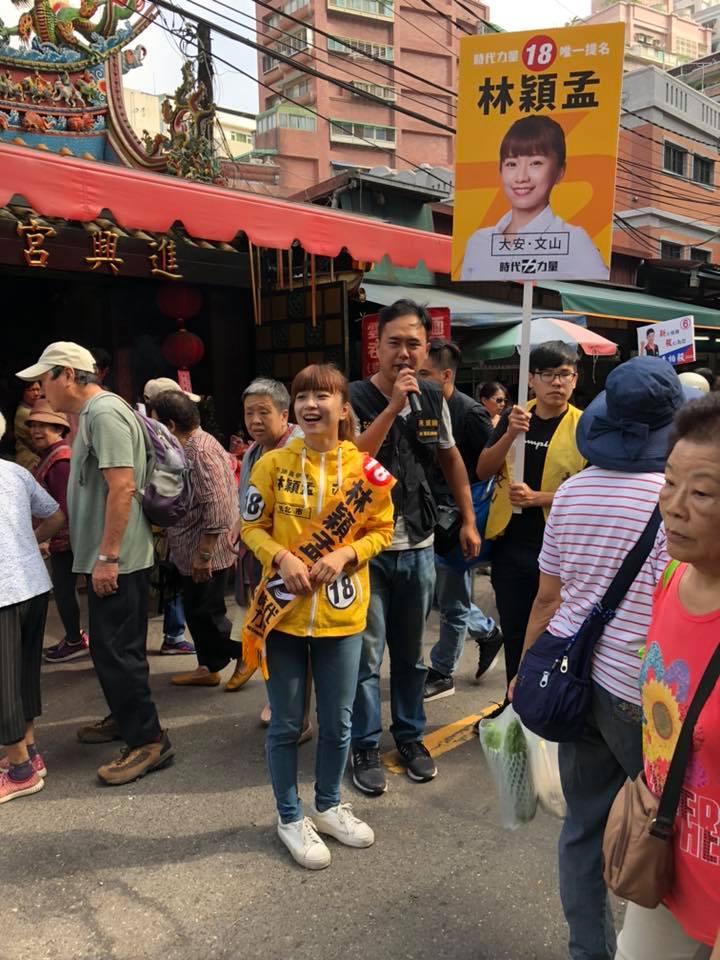 Photo credit: 林穎孟 迎夢台北大安文山/Facebook
Photo credit: 林穎孟 迎夢台北大安文山/Facebook
So I believe my special characteristic is that I was originally a worker in the tech industry. I believe that the tech industry is an industry with potential in Taiwan, and we can promote this industry in order to allow Taiwan to move towards software development rather than taking on subcontract work.
Second, as a worker, my life is the same as everyone else’s everyday life. I hope to bring the voices of regular people and workers into the city council. I can’t necessarily say I have to influence the lives of these people, but this can at the very least represent a new voice, to serve as a platform for dialogue. In this way, when they discuss policy, instead of always having the same perspectives in the room, I can represent a new position—such as from the perspective of an office worker with no ability to purchase a home—and conduct dialogue with them. I believe that in this way, I can pull policy to the center.
BH: What kind of challenges do you have to overcome in running?
LY: First is money and second is recognizability. Other aspects mostly won’t be challenging, but it’s these two things that can really give you a headache. As for funding, when I am canvassing people often ask me, “do you come from a wealthy background?”. I say that I don’t, and they then ask me how I could have money to run for elections. I say that I seek donations and they ask me how someone so young could get donations.
It is true that compared to many elders, many long-term political workers, it is harder for me to raise money. I remember there was an investigation earlier, that 10,000,000 is the average amount spent on elections. I may only spent 1,000,000 or 2,000,000. It’s already so much! It was something I struggled to obtain and it already quite remarkable to raise this much. For other candidates, in other cities, I know that they may only have several hundred thousand. So this is a shared challenge, how we can compete with others when they can pay for so many billboards.
This is the first issue: money. Second is recognizability—which is also related to money. Because others can pay for dozens of billboards and use this as a way to get voters to recognize you. But for me, I don’t have that much money, so it’s not so easy to get voters to recognize me. It’s like fighting a war with an infantry when you know what you really need is to send in the air force to bomb the place in order to really make any impact. If you use the air force, you can expand your range of contact and touch a huge amount of people, but I can’t do the same, so I just have to depend on my infantry to canvas. This is my challenge, that I am not recognizable enough. With a month to go, I still feel that I am not recognizable enough.
BH: Do you think that the political circumstances in Taiwan these past few years can be related to the situation internationally? With the emergence of new political forces, for example.
LY: Take France, for example, we can see their prime minister is extremely young, he’s only in his thirties. But Taiwan’s growing youth participation in politics is different from in Europe, or in the United States with the appearance of Trump in that there have been the emergence of new political parties here. The French prime minister leans right, while we lean left. This is an indication of that polarized forces have appeared. In the past, there were many right-wing forces in Taiwan, but now left-leaning forces have appeared, demonstrating that we now are opposing past situations and traditions.
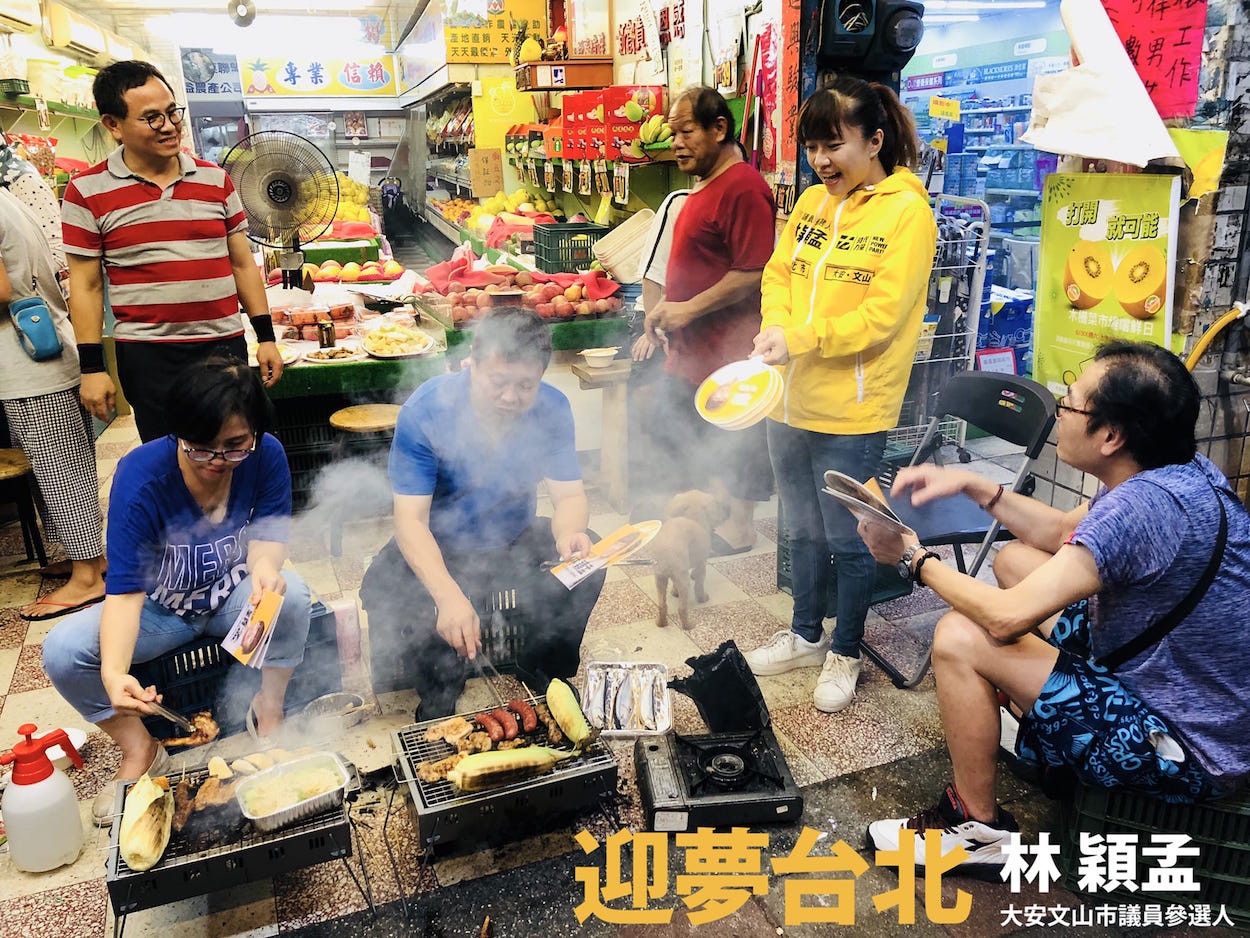 Photo credit: 林穎孟 迎夢台北大安文山/Facebook
Photo credit: 林穎孟 迎夢台北大安文山/Facebook
For Europe, even though we are seeing the appearance of the right, I believe that this also represents a form of opposition to past politics. A left-wing party held power in France in the past, but things became extreme to the point that there was a massive pushback. New political forces appeared, opposing the policies of the long-term ruling power. We’ve even seen the appearance of the far-right in cases like these in Europe and otherwise.
But while you can see that the political spectrum varies, what is shared is a dissatisfaction with the long-term politics of the past, which has led to a counter-attack. The election of Trump is also like this. People were couldn’t deal with the Democratic Party’s dealings after eight years. In our eyes, the Democratic Party is more free, more diverse, and advocates equality as a party. We most likely do not identify with the more conservative Republican Party. But it’s true that they oppose past political trends so although we are different if we’re talking about opposing past political forces, we are the same.
BH: What do you think is different about this election than two years ago? Tsai Ing-Wen has been in power for two years now, for example.
LY: I believe that the situation now is very different from 2016 to 2018. In 2016, the KMT had been in power for eight years, and Ma Ying-jeou was very pro-China to the point where we were letting small and medium-sized Chinese industries directly enter Taiwan.
At the time, there was a sense of crisis, which led to oppositional forces emerging. As a result, in 2016, the DPP took power, completely holding power in both the presidency and legislature for the first time in history. Young people had high hopes that this would lead to changes, that this wouldn’t be like in the past. But after taking power, people have found that it wasn’t what they had hoped, such as with regards to marriage equality and labor rights. The DPP had suddenly become conservative.
Because of this, many young people felt that they had been tricked. The same with workers. Hadn’t they had said they would protect the interests of workers? But instead they began to carry out worse actions than the KMT. I think that this led to a strong reaction, and these three letters, DPP, have become something people have become disgusted with.
So this time with elections, you can see that those who are traditionally DPP supporters have very low desire to turn out. I’m actually a bit worried that because the DPP hasn’t done so well, it could make people think that the KMT is better, and could lead to the KMT taking power again. The KMT is an extremely conservative party, you could even say it’s a little bit like a far-right party with some similarities to feudalism. I believe that it is not a modern political party and should not be allowed to exist in modern times.
But because the DPP’s rule in the past two years have led people to be so disappointed, this may lead to the KMT coming back. This is something I am worried about, and which I hope does not happen during these elections.
 Photo credit: 林穎孟 迎夢台北大安文山/Facebook
Photo credit: 林穎孟 迎夢台北大安文山/Facebook
The KMT currently has more seats in the city council. In 2014, the KMT held more than half the seats, and the DPP did not have over half. I think this may be worse this time, where the DPP may lose seats, and the KMT will have over half.
BH: What would you have to say in closing to readers? Not just Taiwanese readers, but also international readers.
LY: What I discussed before was a phenomenon regarding young people and how they feel towards the DPP. I hope for international readers to know that although the Tsai administration has caused young people to feel very disappointed, in terms of foreign affairs I believe that it has done well and hasn’t been too impatient or rash. For example, as observed in comments by American vice president Mike Pence, matters of diplomacy previously done in private are now becoming internationally visible, especially regarding the tensions rising between America and China here in Asia.
With things being done in public view now, Taiwan cannot be as unclear about its’ stance on issues like how it was in the past. So I think that the Tsai administration has done better than the Ma administration in this regard. But now, being in the public eye, how will Tsai discuss making Taiwan an autonomous independent nation? With rising Chinese nationalism, which threatens us with the possibility of invasion, we have no choice but to make a choice on which side to stand on. Will we let them invade, or will we decide to link up with the United States, Japan, and other countries to defend ourselves?, I think the Tsai administration has decided here not to be that ambitious in doing these things, to avoid giving China a pretext to act against us. I think this aspect has been done well.
So I would like to tell international readers that Taiwan is working hard and we hope that you can pay more attention to issues in the Asia Pacific region, including Taiwan’s current confrontation with our large neighbor and their potential interference. We hope that everyone can pay attention to this and to support Taiwanese people.
BH: Thank you.

